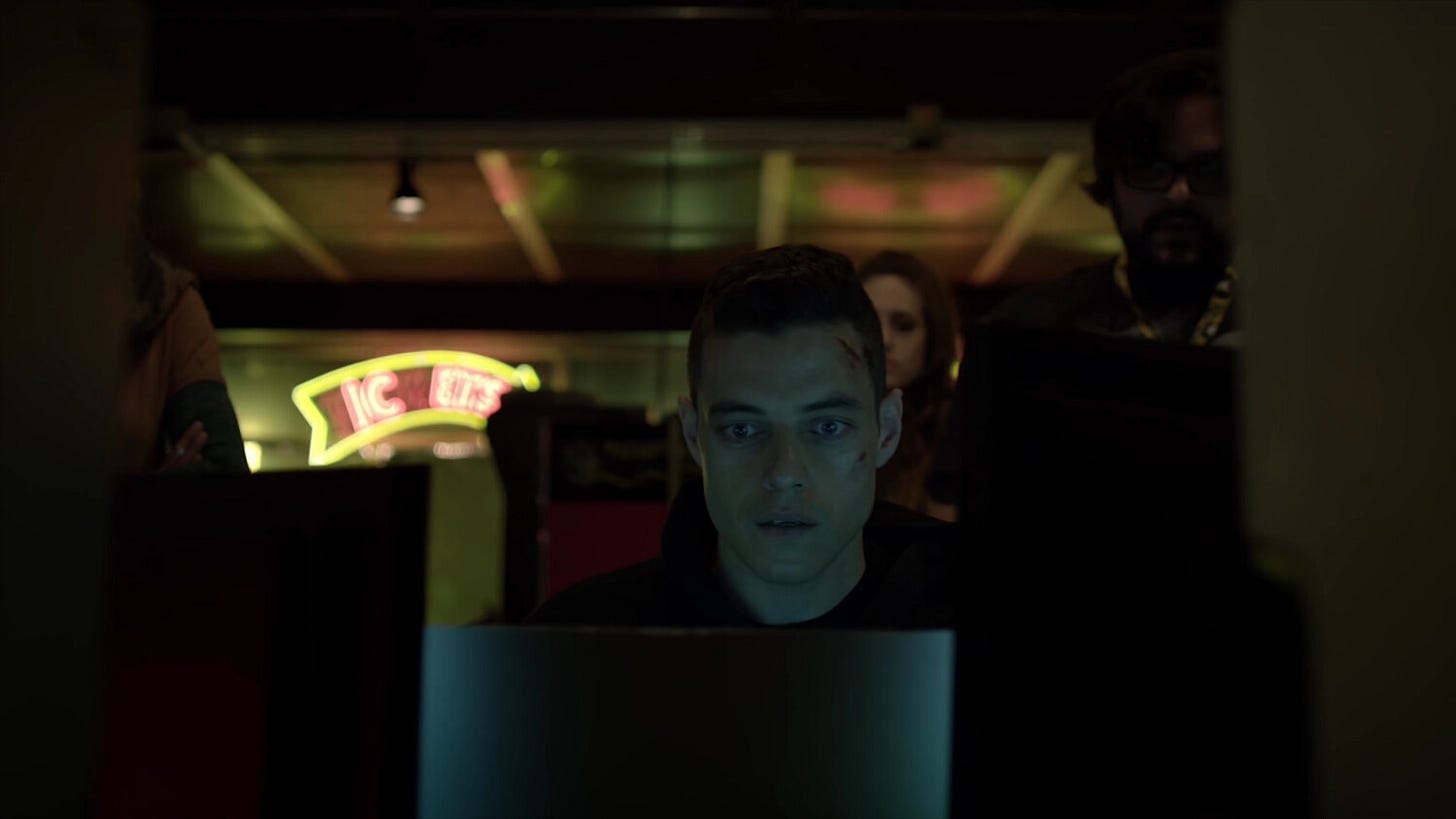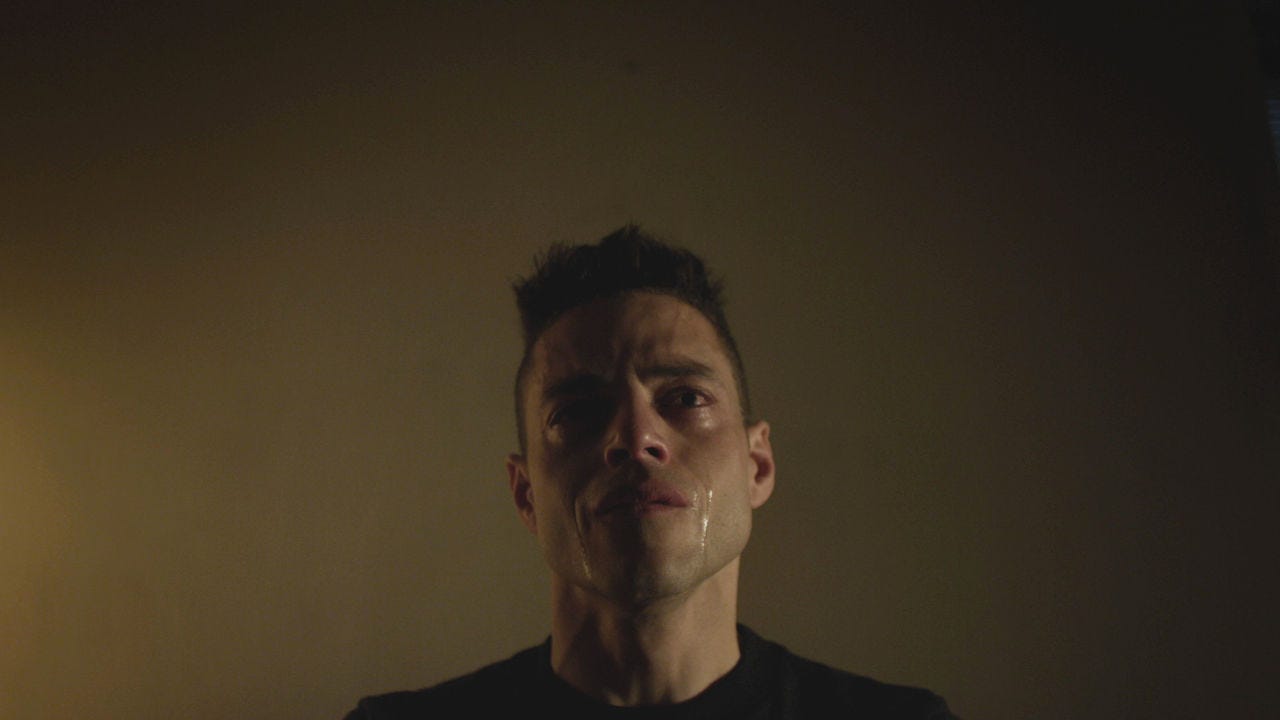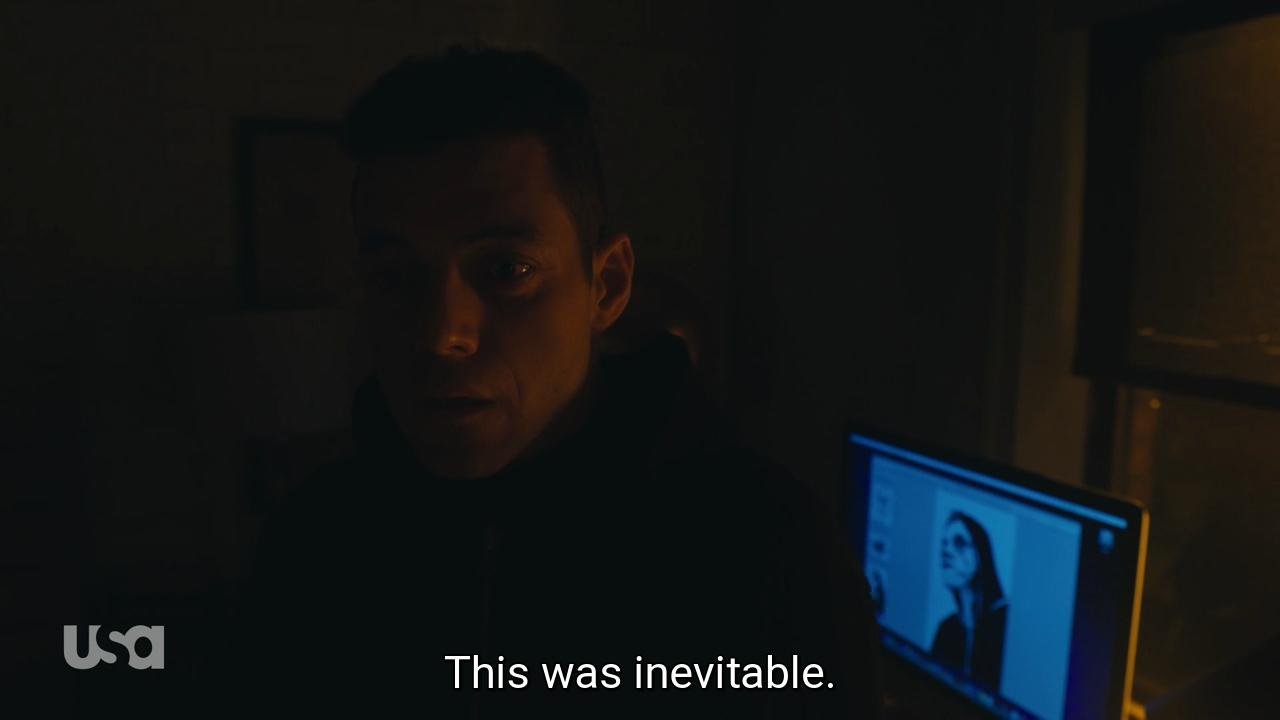It’s happening, it’s happening, it’s happening, it’s happening.
So says Rami Malek as Elliot Alderson, in Mr. Robot’s characteristic hyperspeed, deeply intimate voiceover. The viewer (for both narrative and mental illness reasons) is addressed in first person. The show’s opening line is: “Hello friend?” It’s been ten years since Five/Nine, and nearly ten since the premiere of my strange, beautiful, and frequently rewatched comfort show. Beware spoilers, because this show is best experienced firsthand, though I’ll try to do it justice and dance around the best reveals.
Mr. Robot is a psychological and political thriller following cybersecurity professional/vigilante hacker Elliot as he navigates social isolation and stratification in an increasingly digital and unequal capitalistic society and economy. He becomes a member of hacking group fsociety, which increasingly causes trouble in his personal and professional life as well as potentially making real change in the world.
Five/Nine is the fictional global hack that took place on May 9th, 2015, at the end of the first season of Mr. Robot. Carried out by Elliot, the titular Mr. Robot, and the rest of the fsociety hacker crew in conjunction with China’s Dark Army hacking group, the plot took aim at global financial markets with the goal of eliminating debt and redistributing wealth. It focused on E(vil)-Corp, the world’s largest fictional conglomerate, which was also responsible for the death of Elliot’s father, and the corporate cover-up.
The first season, as full of hope as turmoil (and loneliness, twists, high stakes, gut wrenching character deaths, heart pounding intense moments, a fever dream withdrawal sequence that stands among the best in the series, and more) is the one I’ve watched the most; maybe a dozen times. It’s messy. Revolution is messy, but it makes sense. But the repercussions explored in the following three seasons? A global panic and recession? That’s harder to deal with. It’s harder to build than it is to break. It’s harder to face and heal from the past than it is to change the future. That’s why in reality, it often doesn’t happen at all. (Not to mention the intense pushback from those in power to keep that from happening, much less happening successfully. That is not to negate the absolute necessity of rebellion to upend systems of oppression the world over.)
The show is a psychological show caught up in a societal one, through and through — or the other way around? It depends on the moment. They are intricately connected and sometimes impossible to extricate. The personal is inextricably bound by the societal. In Mr. Robot and in the world, the personal is absolutely political, and the political is personal.
That said, the personal is the ultimate guiding force for the narrative and actions, global and personal, in the show. Creator Sam Esmail says, “This was never about ‘Capitalism: Is it good or bad?’ or ‘How can we fix the world economy?’ or ‘How can we fix the geopolitical nature of money?’ This was about wanting to connect and not being able to connect.”
The anxieties and anger regarding inequality in its many forms, as explored through the seasons, are not new or original. It could be argued they’ve been amplified, but they certainly have been twisted to the benefit, time and again, by right-wing fascists and conservative leadership all over the world and across time to divide and disenfranchise. People generally agree that things are broken, but don’t agree about who’s to blame, or how to fix things. How do you fix systems that are built broken?
Mr. Robot explores the potential realities of this. It evolved as time went on — despite its four seasons taking place in less than a year in its altered 2015 timeline — to keep pace with current events, such as touching on Trump’s first presidential run in later seasons. Its influences include the Occupy Wall Street movement, the Arab Spring, the Anonymous hacker group, Edward Snowden’s revelations, and general history of power and corruption (as well as cool movies like Hackers, Three Days of the Condor, The Matrix, and The Parallax View.) All this without getting into the many lenses through which to view the show and its at times quirky specifics and complex relationships and influences.
It’s comforting to see such a deep exploration of both the subconscious and class consciousness. Perhaps that is because of the great care taken on the internal (and by extension, societal, but in that order) journey of Elliot and his personal revelations and rebellions. Esmail likened his journey over the years to the seven stages of grief. Season one: awakening. Season two: resistance. Season three: disintegration. Season four: integration. Because of its intentional and deep exploration of grief, in its many forms and fights, the show overall feels incredibly cathartic, in spite of it all. And for this, I will keep returning.
Further reading:
*ones with major spoilers will have an asterisk
**‘Mr. Robot’ Is the Defining Show of the 2010s
**Will Mr. Robot Have a Happy Ending?
Full quote, minus spoilers: “I was okay if people had figured that out because I’m never really in it for the shock value. To me, reveals can be impactful when they’re earned. When they’re that mix of inevitable and surprising. That’s the story of this whole show. This was never about “Capitalism: Is it good or bad?” or “How can we fix the world economy?” or “How can we fix the geopolitical nature of money?” This was about wanting to connect and not being able to connect. … When you boil down all the plot machinations, this is really about people and their relationships and their regrets and how they want to come together with the people that they love or the people that they think they want to love. Emotionally, this was about lonely people yearning to connect with somebody.”
“But the thing about the paranoid thriller is it’s always man versus the system, and the system in our real lives continues on. Look at what’s going on with the whole Trump scandal. Even if it kicked out Trump, there’s still gonna be all these issues and all this corruption going on. That is the most salient point of paranoid thrillers: Even if you take down one tentacle, there’s still many others out there. And I wanna honor that. I don’t think you can just take down one Big Bad that’s gonna rule them all and then the world is a better place. That feels like a dishonest take on our world.”
*Mr Robot creator Sam Esmail: 'The world has become unreliable'
Mr. Robot and the New Inequality Entertainment
Images via Kinorium.









